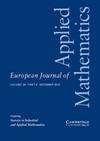在基于共识的优化中利用记忆效应和梯度信息:关于平均场律的全局收敛
IF 1.1
4区 数学
Q1 MATHEMATICS, APPLIED
引用次数: 0
摘要
摘要本文研究了基于共识的优化方法(consensus-based optimization, CBO),这是一种通用的、灵活的、可定制的优化方法,适用于高维的非凸和非光滑全局优化。CBO是一种多粒子元启发式算法,由于其简约的设计,它在各种应用中都是有效的,同时也适合于理论分析。然而,潜在的动力学足够灵活,可以纳入进化计算和机器学习中广泛使用的不同机制,正如我们通过分析利用记忆效应和梯度信息的CBO变体所展示的那样。在方法初始化的最小假设条件下,我们严格地证明了该动力学收敛于目标函数在平均场律下的全局极小值。该证明特别揭示了如何在不失去可证明的全局收敛性的情况下,在某些应用程序中进一步利用有利的动态力量。为了证明本文研究的记忆效应和梯度信息在某些应用中的优势,我们提供了数值证据,证明该CBO变体在机器学习和压缩感知等应用中的优越性,从而扩大了CBO的应用范围。本文章由计算机程序翻译,如有差异,请以英文原文为准。
Leveraging memory effects and gradient information in consensus-based optimisation: On global convergence in mean-field law
Abstract In this paper, we study consensus-based optimisation (CBO), a versatile, flexible and customisable optimisation method suitable for performing nonconvex and nonsmooth global optimisations in high dimensions. CBO is a multi-particle metaheuristic, which is effective in various applications and at the same time amenable to theoretical analysis thanks to its minimalistic design. The underlying dynamics, however, is flexible enough to incorporate different mechanisms widely used in evolutionary computation and machine learning, as we show by analysing a variant of CBO which makes use of memory effects and gradient information. We rigorously prove that this dynamics converges to a global minimiser of the objective function in mean-field law for a vast class of functions under minimal assumptions on the initialisation of the method. The proof in particular reveals how to leverage further, in some applications advantageous, forces in the dynamics without loosing provable global convergence. To demonstrate the benefit of the herein investigated memory effects and gradient information in certain applications, we present numerical evidence for the superiority of this CBO variant in applications such as machine learning and compressed sensing, which en passant widen the scope of applications of CBO.
求助全文
通过发布文献求助,成功后即可免费获取论文全文。
去求助
来源期刊
CiteScore
4.70
自引率
0.00%
发文量
31
审稿时长
>12 weeks
期刊介绍:
Since 2008 EJAM surveys have been expanded to cover Applied and Industrial Mathematics. Coverage of the journal has been strengthened in probabilistic applications, while still focusing on those areas of applied mathematics inspired by real-world applications, and at the same time fostering the development of theoretical methods with a broad range of applicability. Survey papers contain reviews of emerging areas of mathematics, either in core areas or with relevance to users in industry and other disciplines. Research papers may be in any area of applied mathematics, with special emphasis on new mathematical ideas, relevant to modelling and analysis in modern science and technology, and the development of interesting mathematical methods of wide applicability.

 求助内容:
求助内容: 应助结果提醒方式:
应助结果提醒方式:


